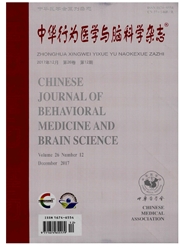

 中文摘要:
中文摘要:
目的 评价七氟醚对新生大鼠脑皮质蛋白质组学的影响.方法 取5窝7d龄大鼠,每窝6只,共30只,采用随机数字表法,将每窝新生大鼠分为对照组(C组)和七氟醚组(S组).C组吸入空气4h,S组吸入1.8%七氟醚4h.麻醉结束后即刻每窝每组取1只新生大鼠,经胸壁穿刺左心室抽取动脉血样,行血气分析,检测血糖.于麻醉结束后3h和72 h时,每窝每组取1只新生大鼠处死,分离脑皮质,用不同的CyDye荧光染料标记后进行胶内差异双向凝胶电泳,并对差异蛋白质进行基质辅助激光解吸离子化飞行时间质谱鉴定和生物学信息分析.结果 两组均未发生酸碱失衡、缺氧和低血糖.与C组比较,S组麻醉结束后3h双向凝胶电泳和质谱分析共鉴定出6个差异表达的蛋白,其中4个与细胞骨架和神经生长相关的蛋白(β微管蛋白2c、Ⅲ型β微管蛋白、脑衰反应调节蛋白1、脑衰反应调节蛋白4)表达下调,1个与能量代谢相关的蛋白(ATP合成酶β亚基)表达下调,1个与信号转导相关的蛋白(G蛋白β1亚基)表达上调(P<0.05).麻醉后72 h未见差异蛋白表达.结论 1.8%七氟醚麻醉新生大鼠4h可短期诱发与脑皮质神经元的迁移分化、能量代谢及信号转导有关的蛋白表达变化,这可能是其诱导发育期鼠脑神经退行性变化的机制.
 英文摘要:
英文摘要:
Objective To evaluate the effects of sevoflurane on proteome in the cortices of neonatal rats.Methods Thirty neonatal rats at postnatal day 7 (6 rats each litter,5 litters in total) were randomly assigned into 2 groups (n =15 each):control group (C group) and sevoflurane group (S group).The rats were exposed to air and 1.8 % sevoflurane for 4 h in C and S groups,respectively.One rat from each litter was chosen in each group at the end of anesthesia and the puncture needle was inserted into the left ventricle via the chest wall.Arterial blood samples were then collected for blood gas analysis and for determination of blood glucose.One rat from each litter was sacrificed in each group at 3 and 72 h after the end of anesthesia,and their cortices were then dissected.Two-dimensional differential in-gel electrophoresis (2-D DIGE) was used to identify patterns of protein expression in cortices cross-labeled with different CyDyes.The differentially expressed proteins were analyzed by using matrixassisted laser desorption/ionization time of flight mass spectrometry (MALDI-TOF-MS).Results Acid-base imbalance,anoxia or lycopenia were not found at 3 h after the end of anesthesia in both groups.The analysis showed there were 6 differentially expressed proteins at 3 h after the end of anesthesia in S group compared with C group.Among the 6 proteins,the expression of 4 proteins (class 2 c beta-tubulin,neuron-specific class Ⅲ beta-tubulin,CRMP-1 and CRMP-4) which belonged to cytoskeleton/neuronal growth proteins was down-regulated,the expression of 1 protein (ATP synthase beta subunit) which belonged to hydrolyses and transferases was down-regulated,and the expression of 1 protein (guanine nucleotide binding protein beta1) which belonged to signal transduction proteins was up-regulated (P < 0.05).No significant changes in protein expression were identified at 72 h after 1.8% sevoflurane anesthesia (P > 0.05).Conclusion 1.8% sevoflurane-induced 4 h anesthesia can induce sh
 关于李玉娟:
关于李玉娟:
 同期刊论文项目
同期刊论文项目
 同项目期刊论文
同项目期刊论文
 期刊信息
期刊信息
